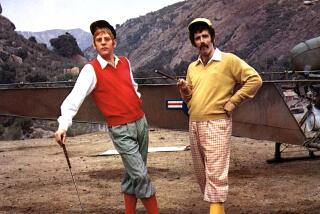Don Taylor; Actor in War Films, Director
- Share via
Don Taylor, actor best known for war films of the 1940s and 1950s, including “Stalag 17,” and director of such science fiction favorites as “Escape From the Planet of the Apes,” has died. He was 78.
Taylor died Tuesday at UCLA Medical Center of heart failure, his family said Wednesday.
During his prolific career behind the camera, Taylor directed 15 motion pictures, more than 400 television dramas and the 1970s series “Night Gallery” and “Mobile One.”
He also wrote one-act plays, radio dramas, short stories and the 1985 TV movie “My Wicked, Wicked Ways . . . The Legend of Errol Flynn.” He directed the Flynn biography, along with another biographical television movie the same year, “Going for the Gold: The Bill Johnson Story.”
Taylor’s script for an NBC show, “The Night They Tore Down Riley’s Bar,” was nominated for an Emmy.
Born Donald Ritchie Taylor in Pittsburgh and raised in Freeport, Pa., he began acting as a student at Pennsylvania State University. After graduation, he hitchhiked to Hollywood and quickly landed a contract with MGM.
Taylor got his big acting break in the Army Air Corps stage production of “Winged Victory.” An Army corporal, Taylor repeated his role in the 1944 film version.
In addition to second billing to William Holden in the 1953 “Stalag 17,” Taylor was in several other war films--”Battleground,” “Flying Leathernecks,” “Destination Gobi,” “Japanese War Bride” and “The Bold and the Brave.”
He also was remembered as the bridegroom in the 1950 version of “Father of the Bride,” starring Spencer Tracy as the father and Elizabeth Taylor as the bride, and its sequel, “Father’s Little Dividend,” a year later.
In 1950, female students from USC and UCLA voted the handsome, clean-cut actor “the man we’d like best to enroll with.”
Occasionally appearing on stage at such venues as the La Jolla Playhouse, Taylor appeared in a three-week run of the play “The Egg” at UCLA’s Schoenberg Hall in 1961. He starred as narrator-hero Emile Magis in a cast that included John McGiver, Gavin MacLeod and Carroll O’Connor.
“Once every 30 years,” Taylor told The Times then, “a part like this comes along. You read it and you say to yourself: ‘This is the reason I got into acting in the first place--to play a part like this.’ So you cancel your contracts, you change all your plans, you mortgage yourself to the bank and you marry yourself to a play.”
He returned to legitimate theater only last year when he wrote and directed Mariette Hartley in “Silver Buckles on His Knee” for the University of Las Vegas Theater Group.
Taylor’s debut as a film director was the 1961 “Everything’s Ducky” featuring Mickey Rooney, Buddy Hackett and Jackie Cooper in a story about a talking duck.
He went on to direct such films as the 1971 “Jack of Diamonds” starring George Hamilton, the 1973 musical “Tom Sawyer,” the 1977 version of H.G. Wells’ “The Island of Dr. Moreau” starring Burt Lancaster, and in 1980, “The Final Countdown” starring Kirk Douglas.
His 1971 “Escape From the Planet of the Apes,” set in Los Angeles and starring Roddy McDowall, was third in the series and considered the best of the sequels to “Planet of the Apes.”
Taylor married his “Winged Victory” co-star, Phyllis Avery, in 1944, and they had two daughters. They were divorced in 1955. He later married British actress Hazel Court, whom he directed in a play he wrote for Alcoa Theater, “The Tweed Hat,” in 1960.
In addition to his wife, he is survived by two daughters, Avery Taylor Moore of San Francisco and Anne Taylor Fleming of Los Angeles; a son, Jonathan David Taylor of Los Angeles; a stepdaughter, Sally Walsh of Los Angeles; a sister, Janet Tuttle; and a granddaughter.
A memorial service will be planned at a later date, the family said.
More to Read
Only good movies
Get the Indie Focus newsletter, Mark Olsen's weekly guide to the world of cinema.
You may occasionally receive promotional content from the Los Angeles Times.










